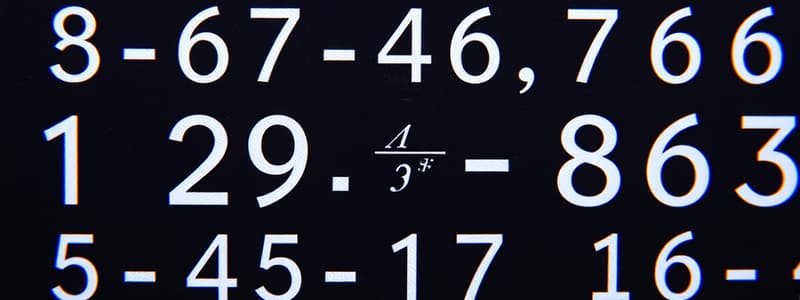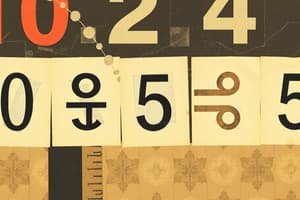Podcast
Questions and Answers
What is the result of rounding up the difference between 30 and 12 to the nearest whole number?
What is the result of rounding up the difference between 30 and 12 to the nearest whole number?
- 17 (correct)
- 16
- 19
- 18
When rounding up the number 24.87 to one decimal place, what is the result?
When rounding up the number 24.87 to one decimal place, what is the result?
- 24.7
- 24.8 (correct)
- 25.0
- 24.9
In which scenario is rounding up especially useful?
In which scenario is rounding up especially useful?
- Estimating distances (correct)
- Calculating average scores
- Arranging alphabetical lists
- Adjusting margins in documents
What should you consider first when performing rounding up calculations?
What should you consider first when performing rounding up calculations?
Flashcards are hidden until you start studying
Study Notes
Rounding Up the Difference of Numbers
-
Definition: Rounding up refers to the process of adjusting a number to the nearest whole number or specified decimal place, taking it to the next higher number.
-
Importance: Useful in estimation, budgeting, and simplifying calculations.
Steps to Find the Difference and Round Up
-
Calculate the Difference:
- Subtract the smaller number from the larger number:
Difference = Larger Number - Smaller Number
- Subtract the smaller number from the larger number:
-
Determine Rounding Point:
- Decide the place to which you want to round (nearest whole number, tenth, hundredth, etc.).
-
Apply Rounding Rules:
- For whole numbers:
- If the digit to be rounded is 0-4, round down (keep the number the same).
- If the digit is 5-9, round up (increase the number by 1).
- For decimals:
- Identify the first digit after the rounding point.
- Follow the same rounding rules as above.
- For whole numbers:
-
Result:
- The final result after rounding up gives a simplified, higher value of the difference calculated.
Examples
-
Example 1:
- Numbers: 15 and 7
- Difference: 15 - 7 = 8
- Rounding: Already a whole number, result = 8.
-
Example 2:
- Numbers: 12.4 and 3.1
- Difference: 12.4 - 3.1 = 9.3
- Rounding (to the nearest whole number): 9.3 rounds up to 10.
-
Example 3:
- Numbers: 25.67 and 10.2
- Difference: 25.67 - 10.2 = 15.47
- Rounding (to one decimal place): 15.47 rounds up to 15.5.
Tips
- Always be clear on the rounding criteria before starting calculations.
- Use rounding up when dealing with measurements for safety or precaution (e.g., in cooking or construction).
- Practice with various numbers to become proficient in rounding techniques.
Rounding Up the Difference of Numbers
- Rounding up involves adjusting a number to the next higher value based on a specified criterion, such as whole numbers or decimal points.
- It is essential for estimation, budgeting, and simplifying complex calculations.
Steps to Find the Difference and Round Up
- Calculate the Difference: Subtract the smaller number from the larger to find the difference.
- Determine Rounding Point: Identify the decimal place at which to round (whole number, tenth, hundredth, etc.).
- Apply Rounding Rules:
- For whole numbers, digits 0-4 round down, while digits 5-9 round up.
- For decimal numbers, look at the first digit after the rounding point and apply the same rules.
- Result: After rounding up, obtain a simplified and higher value of the calculated difference.
Examples
- Example 1: Difference between 15 and 7 is 8, which is already a whole number.
- Example 2: Difference between 12.4 and 3.1 is 9.3, which rounds up to 10 when rounding to the nearest whole number.
- Example 3: Difference between 25.67 and 10.2 is 15.47, which rounds up to 15.5 when rounding to one decimal place.
Tips
- Clearly define rounding requirements before performing calculations for accuracy.
- Use rounding up in contexts like measurements for safety in cooking or construction.
- Practice rounding techniques with various numbers to enhance proficiency.
Studying That Suits You
Use AI to generate personalized quizzes and flashcards to suit your learning preferences.




